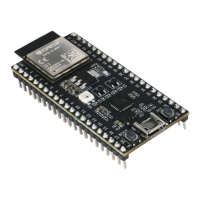Chapter 2. API Reference
• key_id: the HMAC key ID determining the HMAC key of the HMAC which will be used to
decrypt the signing key data
• signature: the destination of the signature, should be (data->rsa_length + 1)*4 bytes long
esp_err_t esp_ds_start_sign(const void *message, const esp_ds_data_t *data, hmac_key_id_t
key_id, esp_ds_context_t **esp_ds_ctx)
Start the signing process.
This function yields a context object which needs to be passed to esp_ds_finish_sign() to finish the
signing process.
Note This function locks the HMAC, SHA, AES and RSA components, so the user has to ensure to call
esp_ds_finish_sign() in a timely manner.
Return
• ESP_OK if successful, the ds operation was started now and has to be finished with
esp_ds_finish_sign()
• ESP_ERR_INVALID_ARG if one of the parameters is NULL or data->rsa_length is too long or 0
• ESP_ERR_HW_CRYPTO_DS_HMAC_FAIL if there was an HMAC failure during retrieval of
the decryption key
• ESP_ERR_NO_MEM if there hasn’t been enough memory to allocate the context object
• ESP_ERR_HW_CRYPTO_DS_INVALID_KEY if there’s a problem with passing the HMAC
key to the DS component
Parameters
• message: the message to be signed; its length is determined by data->rsa_length
• data: the encrypted signing key data (AES encrypted RSA key + IV)
• key_id: the HMAC key ID determining the HMAC key of the HMAC which will be used to
decrypt the signing key data
• esp_ds_ctx: the context object which is needed for finishing the signing process later
bool esp_ds_is_busy(void)
Return true if the DS peripheral is busy, otherwise false.
Note Only valid if esp_ds_start_sign() was called before.
esp_err_t esp_ds_finish_sign(void *signature, esp_ds_context_t *esp_ds_ctx)
Finish the signing process.
Return
• ESP_OK if successful, the ds operation has been finished and the result is written to signature.
• ESP_ERR_INVALID_ARG if one of the parameters is NULL
• ESP_ERR_HW_CRYPTO_DS_INVALID_DIGEST if the message digest didn’t match; the sig-
nature is invalid.
• ESP_ERR_HW_CRYPTO_DS_INVALID_PADDING if the message padding is incorrect, the sig-
nature can be read though since the message digest matches.
Parameters
• signature: the destination of the signature, should be (data->rsa_length + 1)*4 bytes long
• esp_ds_ctx: the context object retreived by esp_ds_start_sign()
esp_err_t esp_ds_encrypt_params(esp_ds_data_t *data, const void *iv, const esp_ds_p_data_t
*p_data, const void *key)
Encrypt the private key parameters.
Return
• ESP_OK if successful, the ds operation has been finished and the result is written to signature.
• ESP_ERR_INVALID_ARG if one of the parameters is NULL or p_data->rsa_length is too long
Parameters
• data: Output buffer to store encrypted data, suitable for later use generating signatures. The al-
located memory must be in internal memory and word aligned since it’s filled by DMA. Both is
asserted at run time.
• iv: Pointer to 16 byte IV buffer, will be copied into‘data’. Should be randomly generated bytes
each time.
• p_data: Pointer to input plaintext key data. The expectation is this data will be deleted after this
process is done and ‘data’is stored.
Espressif Systems 278
Submit Document Feedback
Release v4.4

